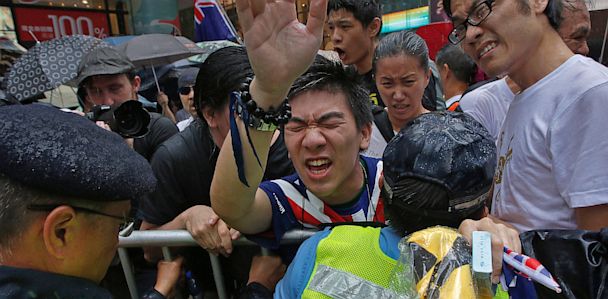Hong Kong Nationals Protest Beijing in Annual March

(Vincent Yu/AP Photo)
Despite torrential rains, thousands of protesters spilled into the streets of Hong Kong to express dissatisfaction with the Beijing-backed chief executive, Leung Chun-ying, and demand universal suffrage and democratic reforms.
The protests Monday were part of what has become an annual July 1 protest march to mark the 16th anniversary of the reunification of Hong Kong with China.
Often referred to as "the Return" or "the Handover," the 1997 reunification signaled the end of British rule in Hong Kong after 99 years.
Now, Hong Kong is a special administrative region. As part of the handover agreement, Hong Kong is guaranteed its own freedoms and legal system for the next 50 years.
This year's protest was sparked by public dissatisfaction with the performance of Leung, whose year in office has been plagued by controversy. Several of Leung's appointments during his transition into office were met with public criticism, and Leung also upset many of the region's native Cantonese speakers by giving his inaugural speech completely in Mandarin.
Leung's support rating earlier in June was a 46.2, only 0.2 higher than his all-time lowest rating in September, according to a survey conducted by the University of Hong Kong's Public Opinion Program.
Leung was not elected to office, but appointed by a committee made up of pro-Beijing elites. Beijing has promised that Hong Kong citizens will be able to pick their own chief executive through universal suffrage no later than 2017 and pick an entire legislature by 2020.
Leung, as current chief executive, is responsible for spearheading initiatives and providing an election plan for 2017.
However, residents of the special administrative region fear that with all of the controversy that surrounds Leung's current term, true universal suffrage will not actually be implemented. This, compounded with few signs of progress, has left the Hong Kong people frustrated by the state of their government.
"Hong Kong people have been waiting too long for universal suffrage and for building a democratic city," said Andrew Shum of Civil Human Rights Front, the group that organized the event, according to The Associated Press. "Many people feel very angry."
Leung said in a speech that the "government will launch a consultation at an appropriate juncture" on introducing full democracy, and told reporters the government will listen "carefully" to protesters' demands, according to the AP.
Although the Chinese government has begun to ban Weibo posts that comment on the protests, activists continue to remain vocal on China's version of Twitter. One user described the streets of Hong Kong as filled with people of "one mind and one heart," adding, "long live freedom!" Other online activists used the words "spectacular" and "patriotic" to describe the scene that unfolded.
Protesters began their march at Victoria Park during the early afternoon and were ultimately headed to the Chater Garden in Central.
Event organizers estimated the turnout to be around 430,000 people, while the police estimated 33,500 participants. An on-site count by the University of Hong Kong suggested that the turnout was approximately 103,000 people.
Meanwhile, the Hong Kong Dome Festival was being held at the former Kai Tak runway. Critics claimed the concert was a ploy by the government to distract young people from the protest.
Also during the protests, the anniversary of the handover was being celebrated throughout the 18 districts in 37 different venues. The chairman of the Hong Kong Celebrations Association said that 225,000 people attended these celebrations, with one crowd of 1,500 mostly middle-aged people chanting slogans such as, "C.Y., we support you."